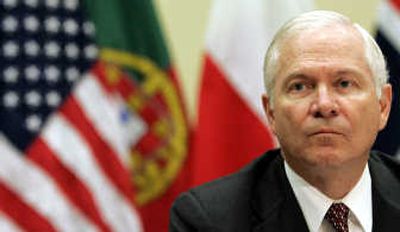Escalation of U.S. forces complete

BAGHDAD – All of the U.S. troops deployed as part of President Bush’s military “surge” are in Iraq, a military spokesman said Friday, but the deaths of five soldiers and the crash of an Air Force fighter jet underscored the perils they face trying to quell Iraq’s violence.
Defense Secretary Robert Gates arrived in Baghdad late Friday on an unannounced visit. Gates is the latest in a string of high-ranking U.S. military and political officials to visit for meetings with Iraqi leaders, who are being pressed to enact political reforms that might ease the insurgency.
Gates arrived at a capital strangely hushed, the result of a three-day curfew imposed after the bombing of a revered Shiite mosque on Wednesday.
The effects of the curfew were most evident in the nightly police tally of murder victims found on Baghdad’s streets. Only one body bearing the hallmarks of a death squad victim was found, compared with the 25 or more that are picked up most days. The victim was a man who had been shot to death and whose corpse was dumped near a bus station.
Outside the southern city of Basra, a Sunni mosque was attacked in what was believed to be an act avenging the bombing of the Shiite shrine. Local residents said the Sunni site was destroyed by men who planted bombs inside.
For the most part, though, Iraqis appeared to be heeding calls from religious and political leaders to refrain from the kind of sectarian bloodshed that followed the bombing in February 2006 of the Golden Mosque, the same shrine attacked this week. During Friday prayer services, Shiite and Sunni clerics called for unity among Muslims. Some used their services to step up rhetoric against the U.S. occupation, blamed by many Iraqis for the sectarian tensions.
Gates was the third U.S. official to visit Iraq in a week, and he was expected to deliver the same message as the others: that Washington wants Prime Minister Nouri al-Maliki’s government to pass some of the legislation seen as essential to promoting national reconciliation. That would include a law to share oil wealth, and another to permit members of the ex-Baathist Party regime to return to jobs in government and the military.
Gates’ arrival coincided with the military’s announcement of five more U.S. troop deaths in Iraq, increasing to 3,519 the number killed since the war began in March 2003. The tally comes from Icasualties.org, which tracks military and civilian casualties in the war.
The latest U.S. combat deaths occurred Thursday north of Baghdad. Three soldiers died outside Kirkuk when an explosion occurred near their vehicle. Another was killed in Diyala province when a patrol came under small-arms fire. A noncombat death occurred Wednesday, according to a military statement that gave no further details.
The Air Force said the F-16 crashed early Friday while flying a “close-air support mission” from its base about 50 miles north of Baghdad and carried one crewmember. The brief statement gave no other details.
Army Lt. Col. Christopher Garver, a military spokesman, said the last of the extra 28,500 troops deployed to Iraq as part of the security plan had arrived in recent days. Garver said, however, that the final brigade would take 30 to 60 days to “get integrated into the area in which they are operating.”
The military repeatedly has said it will take months for the full effect of the security plan to be felt but that there are signs of progress in the declines of sectarian killings and the cooperation of some tribal sheiks who once supported the insurgency. Lately, however, sectarian killings have begun to rise again, according to Iraqi police and U.S. military statistics.
The military says the increase has not been substantial and is part of the roller coaster effect it says is to be expected because of the varying degrees of cooperation that security forces are getting in different areas.
One sign of progress, Garver said, was the discovery of more homemade explosives rather than professional-grade bombs in western Anbar province, which used to be a stronghold of Sunni insurgents. This could be the result of increased numbers of weapons caches being discovered by troops who in recent months began receiving cooperation from tribal sheiks, he said.